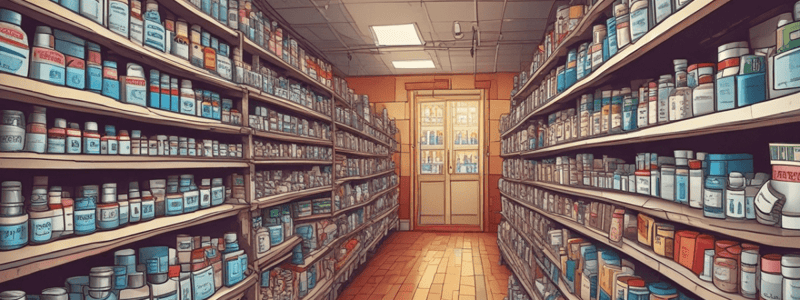Podcast
Questions and Answers
What is the primary difference between drug-related problems and medication errors?
What is the primary difference between drug-related problems and medication errors?
- Drug-related problems are unavoidable, while medication errors are preventable. (correct)
- Medication errors are related to patient misuse, while drug-related problems are related to healthcare provider mistakes.
- Medication errors are always intentional, while drug-related problems are unintentional.
- Medication errors occur during administration, while drug-related problems occur during prescribing.
Which type of medication error occurs when a patient receives the wrong drug or dose?
Which type of medication error occurs when a patient receives the wrong drug or dose?
- Dispensing error (correct)
- Administration error
- Monitoring error
- Prescribing error
What is an example of a medication error that reaches the patient due to an illegible prescription?
What is an example of a medication error that reaches the patient due to an illegible prescription?
- Wrong administration time
- Illegible prescription (correct)
- Incorrect handling of drugs during administration
- Omitted dose
What is the primary focus of ASHP guidelines related to safe use of medications?
What is the primary focus of ASHP guidelines related to safe use of medications?
What is the primary goal of unit dose dispensing?
What is the primary goal of unit dose dispensing?
Which of the following is NOT a type of medication error?
Which of the following is NOT a type of medication error?
What is the primary reason for inpatient dispensing?
What is the primary reason for inpatient dispensing?
What is an example of an administration error?
What is an example of an administration error?
What is the primary cause of a Route of Administration Error?
What is the primary cause of a Route of Administration Error?
Which of the following is an example of a Hospital Administration Related Factor contributing to medication errors?
Which of the following is an example of a Hospital Administration Related Factor contributing to medication errors?
What is the primary cause of a Deteriorated Drug Error?
What is the primary cause of a Deteriorated Drug Error?
Which of the following is an example of a Technique Related Factor contributing to medication errors?
Which of the following is an example of a Technique Related Factor contributing to medication errors?
What is the primary cause of a Monitoring Error?
What is the primary cause of a Monitoring Error?
Which of the following is an example of a Facility Related Factor contributing to medication errors?
Which of the following is an example of a Facility Related Factor contributing to medication errors?
What is the primary cause of a Drug Preparation Error?
What is the primary cause of a Drug Preparation Error?
Which of the following is an example of a Personnel Related Factor contributing to medication errors?
Which of the following is an example of a Personnel Related Factor contributing to medication errors?
What is a crucial step in the receipt of a prescription?
What is a crucial step in the receipt of a prescription?
Which of the following is a potential solution to the lack of personnel in a hospital?
Which of the following is a potential solution to the lack of personnel in a hospital?
What task can be delegated to supportive personnel in a pharmacy?
What task can be delegated to supportive personnel in a pharmacy?
What is the primary reason for inadequate labeling of drugs issued to nursing stations?
What is the primary reason for inadequate labeling of drugs issued to nursing stations?
Which of the following is NOT a solution to the lack of personnel in a hospital?
Which of the following is NOT a solution to the lack of personnel in a hospital?
What is a potential benefit of using a consultant pharmacist?
What is a potential benefit of using a consultant pharmacist?
What is a major factor related to facility that can contribute to medication errors?
What is a major factor related to facility that can contribute to medication errors?
Which of the following is a recommendation by the Institute of Medicine to prevent medication errors?
Which of the following is a recommendation by the Institute of Medicine to prevent medication errors?
What is a consequence of medical care without a pharmacist?
What is a consequence of medical care without a pharmacist?
What is a role of healthcare payers and oversight organizations in preventing medication errors?
What is a role of healthcare payers and oversight organizations in preventing medication errors?
What is a technique-related factor that can contribute to medication errors?
What is a technique-related factor that can contribute to medication errors?
What is a benefit of involving patients in the medication use process?
What is a benefit of involving patients in the medication use process?
What is a purpose of a comprehensive policy on incident detection and reporting system?
What is a purpose of a comprehensive policy on incident detection and reporting system?
What is a responsibility of the hospital administration in preventing medication errors?
What is a responsibility of the hospital administration in preventing medication errors?
What is the primary reason for inadequate inpatient drug stations dispensing on patient care areas?
What is the primary reason for inadequate inpatient drug stations dispensing on patient care areas?
What is the purpose of using a label position indicator on medication containers?
What is the purpose of using a label position indicator on medication containers?
What is the benefit of using a medication cabinet in a small hospital?
What is the benefit of using a medication cabinet in a small hospital?
What is the primary feature of a medication room that makes it ideal for medication preparation and storage?
What is the primary feature of a medication room that makes it ideal for medication preparation and storage?
What is the purpose of using a double lock on a safe used for narcotics in a medication room?
What is the purpose of using a double lock on a safe used for narcotics in a medication room?
What is the benefit of using colour coding on medication labels?
What is the benefit of using colour coding on medication labels?
What is the primary feature of a medication cabinet that makes it a convenient solution for small hospitals?
What is the primary feature of a medication cabinet that makes it a convenient solution for small hospitals?
What is the purpose of dividing shelves in a medication room?
What is the purpose of dividing shelves in a medication room?
Flashcards are hidden until you start studying
Study Notes
Medication Error
- Medication errors are errors or mistakes in the medication use process (prescribing, dispensing, administering of drugs) that may result in negative outcomes.
- Difference between drug-related problems and medication errors:
- Drug-related problems (DRPs) are problems in medication use that can occur even when best medication practices are applied.
- Examples of DRPs: side effects, potential upset stomach associated with non-steroidal anti-inflammatory drugs.
Classification of Medication Errors
- Prescribing errors:
- Occur when prescriptions have an incorrect drug selection, dose, dosage form, quantity, route, concentration, rate of administration, or instructions for use of a drug product.
- Include illegible prescriptions or medication orders that lead to errors that reach the patient.
- Dispensing errors:
- Mistakes made during the dispensing process where a patient receives the wrong drug, the correct drug for the wrong patient, or wrong dose.
- Administration errors:
- Occur when patients are administered something other than that prescribed for the patient – the wrong dose, omitted dose, additional dose, wrong administration time, incorrect handling of drugs during administration, or wrong infusion rate.
- Drug Preparation Error:
- Drug product incorrectly formulated or manipulated before dispensing or administration.
- Route of Administration Error:
- Wrong route of administration of the correct drug.
- Administration Technique Error:
- Inappropriate procedure or improper technique in the administration of a drug other than wrong route.
- Deteriorated Drug Error:
- Dispensing or administration of a drug that has expired or for which the physical or chemical dosage-form integrity has been compromised.
- Monitoring Error:
- Failure to review a prescribed regimen for appropriateness and detection of problems, or failure to use appropriate clinical or laboratory data for adequate assessment of patient response to prescribed therapy.
Factors Contributing to Medication Errors
- Hospital Administration Related Factors:
- Inadequate policies regarding safe use of medication.
- Inadequate policies governing reporting of incidents in the institution.
- Inadequate policies concerning performance of tasks for supportive personnel.
- Personnel Related Factors:
- Lack of hospital pharmacist.
- Lack of administration nurse.
- Overburdened personnel.
- Technique Related Factors:
- Use of non-professional personnel in areas requiring professional judgment.
- Inadequate labeling of drugs and allied items for nursing station.
- Facility Related Factors:
- Inadequate storage and equipment facilities.
- Inadequate drug station on patient care areas.
Preventing Medication Errors
- Institute of Medicine recommendations:
- Involve patients in the medication use process.
- Provide consumer-oriented medication resources to support patient self-management.
- Ensure healthcare providers have access to patient information and decision-support tools.
- Improve medication labeling and communication methods.
- Encourage healthcare payers and oversight organizations to promote good medication use practices.
Corrective Measures
- Administration-Related Measures:
- Formulate policies regarding safe use of medication.
- Implement a comprehensive policy on incident detection and reporting system for each drug accident in the hospital.
- Lack of Personnel:
- Hire a pharmacist to oversee pharmaceutical services.
- Share pharmacists between two or more small hospitals.
- Combine responsibilities such as procurement and administration.
- Purchase pharmaceutical services from community pharmacies.
- Use consultant pharmacists.
- Use supportive personnel for tasks such as taking telephone orders, weighing or measuring ingredients, and affixing labels.
- Inadequate Labeling of Drugs:
- Affix labels with necessary information (strength, identification, route of administration, warnings, and cautions).
- Use color coding, label position indicators, and auxiliary labels.
- Inadequate Drug Stations on Patient Care Areas:
- Provide medication cabinets or rooms for preparation and storage of medications.
- Ensure medication rooms are designed for observation, quiet, and security, with features such as divided shelves, safe storage, and secure narcotics storage.
Studying That Suits You
Use AI to generate personalized quizzes and flashcards to suit your learning preferences.




